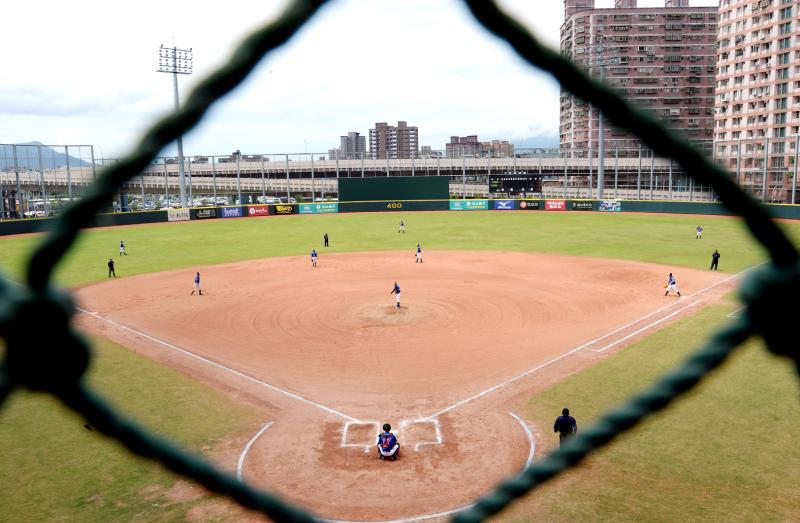Taiwan’s baseball league is continuing as a trailblazer for sports resuming after the lockdown in the coronavirus pandemic.
An easing last weekend allows more fans at the ballparks, allows them to sit closer together and consume food and drinks while they’re supporting their teams in the Taiwanese CPBL.
Masks are optional, when seated.

Photo: Lin Cheng-fang
The Taiwan league resumed play in April in empty stadiums while elite sports globally were still in lockdown, and last month started allowing up to 1,000 fans to attend games under strict social distancing measures.
On Sunday, after the government again loosened its COVID-19 restrictions, fans were only required to wear surgical face masks when they weren’t in their seats, and the stadiums were allowed to be up to 50 percent full of fans.
The CPBL is continuing to observe limited social distancing by ordering a one-seat gap be maintained between fans.
The lifting of restrictions was welcomed at Tuesday’s game between the defending CPBL champion Rakutan Monkeys and the visiting Uni-Lions in Tainan.
CHEERING WITHOUT MASKS
Monkeys fan Martha Chen said she could now cheer as much as she wants without a mask. The Uni-Lions held off a ninth inning rally to beat the defending CPBL champions 7-6.
“From now on, we don’t have to wear a mask when we watch a baseball game at the stadium. This allows me to shout out loud as much as I want to cheer for my team,” the 31-year-old Chen, an air transport worker, said. “And my kid would not bother me with taking the mask off. Kids find it hard to wear a mask.”
Uni-Lions pitcher Logan Darnell said the easing of restrictions on fans made it feel “a lot more like a baseball game.”
“Everybody is excited that there’s less restrictions on the fans coming in. They make us feel a lot more normal than what is was beforehand,” Darnell said. “You had a certain amount of people that can come in, and everybody was spread out. And even before that, when there was nobody in the stands, that was just a different ... different feel. But now that everybody is back and the restrictions are kind of less, it’s going feel a lot more like a baseball game for sure.”
Taiwan, which has had 433 COVID-19 cases among a population of 23 million, limited the spread by imposing flight restrictions and through contact tracing of anyone who comes near a confirmed patient.
Elite sports leagues are gradually resumed in some countries, mostly without fans in stadiums or with very small crowds under strict physical distancing restrictions.

Jacques Poissant’s suffering stopped the day he asked his daughter if it would be “cowardly to ask to be helped to die.” The retired Canadian insurance adviser was 93, and “was wasting away” after a long battle with prostate cancer. “He no longer had any zest for life,” Josee Poissant said. Last year her mother made the same choice at 96 when she realized she would not be getting out of hospital. She died surrounded by her children and their partners listening to the music she loved. “She was at peace. She sang until she went to sleep.” Josee Poissant remembers it as a beautiful

Before the last section of the round-the-island railway was electrified, one old blue train still chugged back and forth between Pingtung County’s Fangliao (枋寮) and Taitung (台東) stations once a day. It was so slow, was so hot (it had no air conditioning) and covered such a short distance, that the low fare still failed to attract many riders. This relic of the past was finally retired when the South Link Line was fully electrified on Dec. 23, 2020. A wave of nostalgia surrounded the termination of the Ordinary Train service, as these train carriages had been in use for decades

March 2 to March 8 Gunfire rang out along the shore of the frontline island of Lieyu (烈嶼) on a foggy afternoon on March 7, 1987. By the time it was over, about 20 unarmed Vietnamese refugees — men, women, elderly and children — were dead. They were hastily buried, followed by decades of silence. Months later, opposition politicians and journalists tried to uncover what had happened, but conflicting accounts only deepened the confusion. One version suggested that government troops had mistakenly killed their own operatives attempting to return home from Vietnam. The military maintained that the

Lori Sepich smoked for years and sometimes skipped taking her blood pressure medicine. But she never thought she’d have a heart attack. The possibility “just wasn’t registering with me,” said the 64-year-old from Memphis, Tennessee, who suffered two of them 13 years apart. She’s far from alone. More than 60 million women in the US live with cardiovascular disease, which includes heart disease as well as stroke, heart failure and atrial fibrillation. And despite the myth that heart attacks mostly strike men, women are vulnerable too. Overall in the US, 1 in 5 women dies of cardiovascular disease each year, 37,000 of them